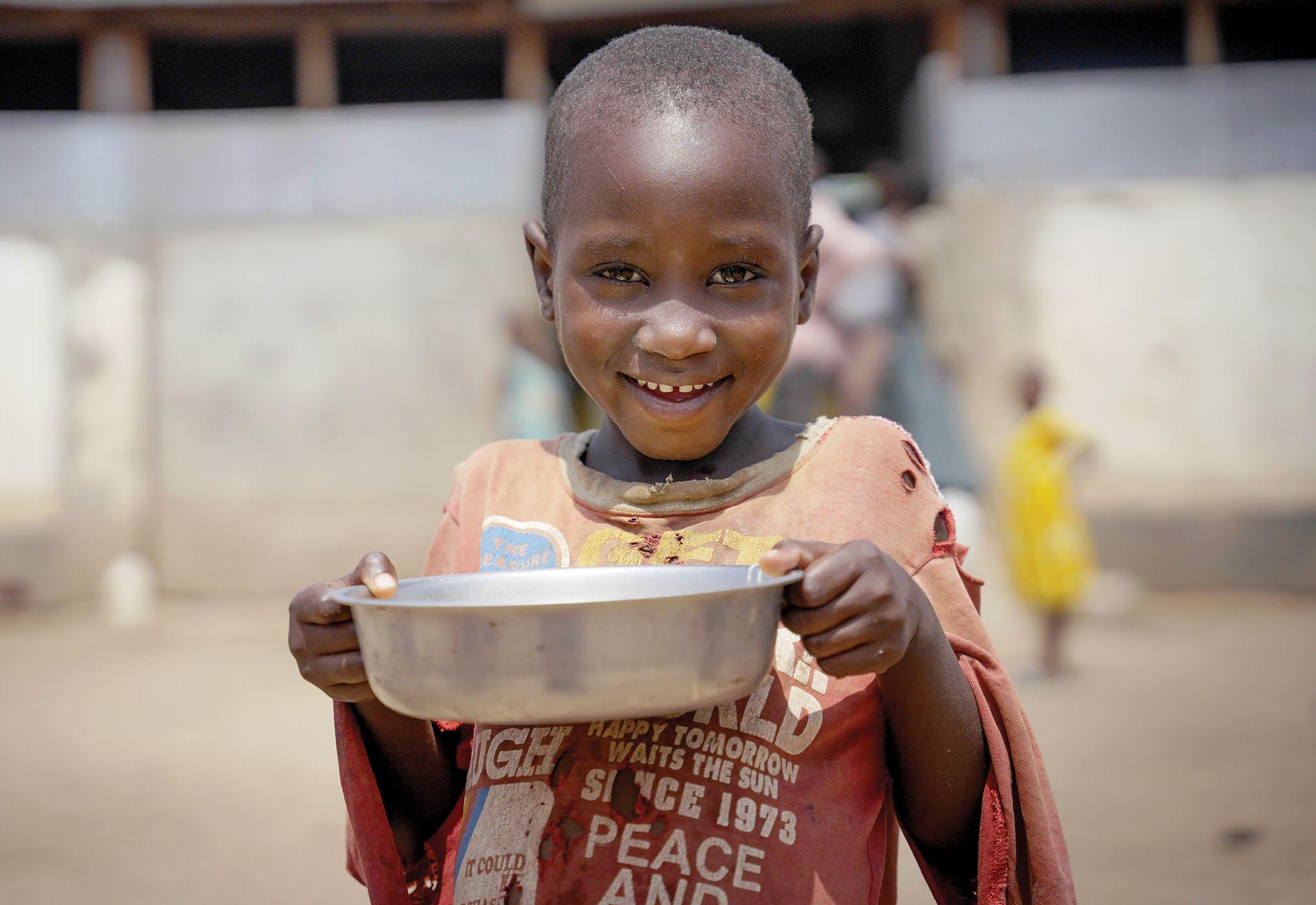



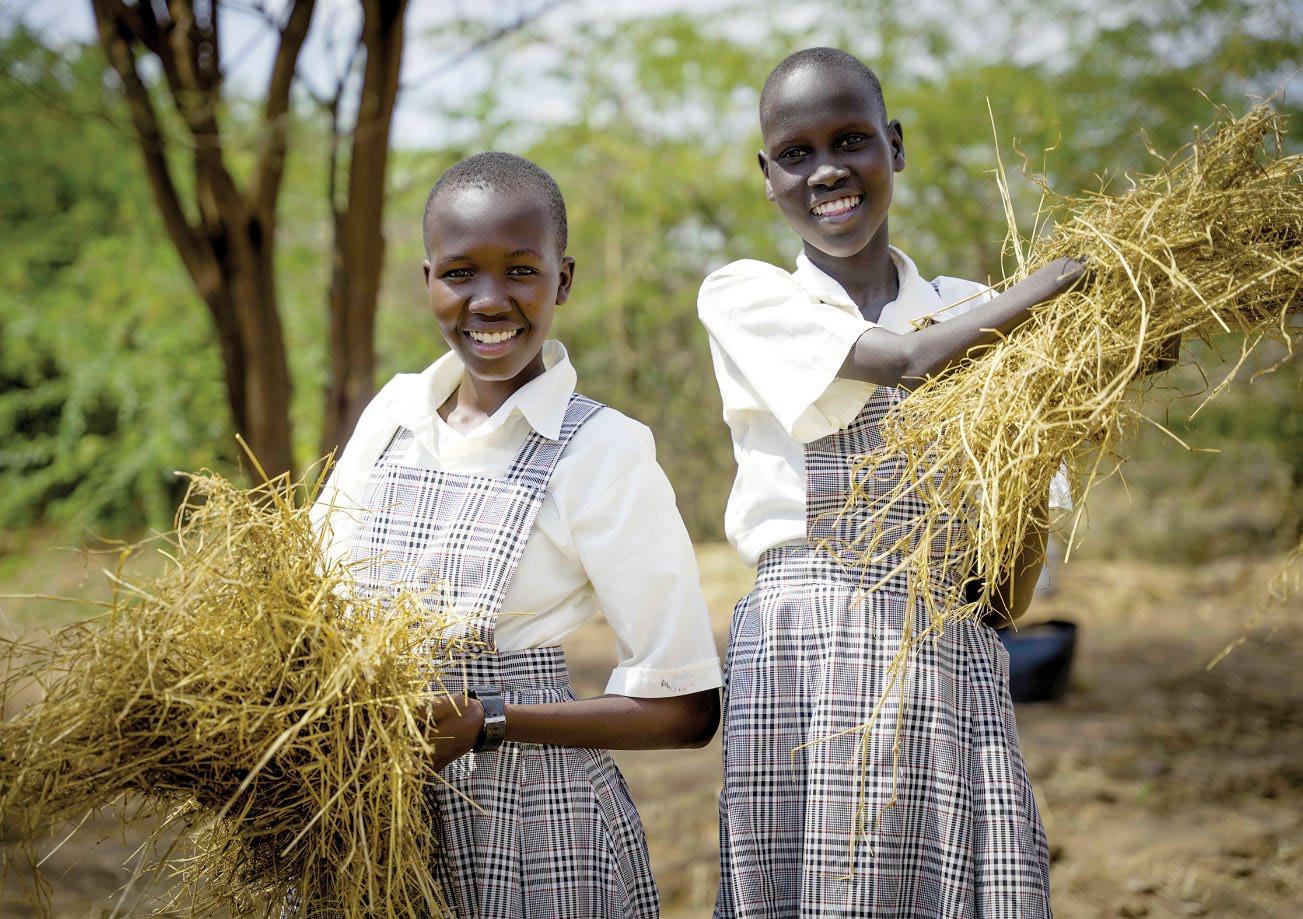






O�eno knows well the value of the vegetables growing in the kitchen garden for her students, far beyond their nutri�onal benefits:
“Kitchen gardening enhances learning by the pupils and encourages a farming culture”.
Mary is in grade 7 and already learning the benefits of the iron contained in the vegetables for her and her friends, and as she sets about watering the garden before breakfast her face lights up at what’s emerging from the soil.
Sadia’s already picturing how the skills she’s picking up from the school gardens will wind their way into her future: “I like farming, when I finish school and if I don’t get a job, I will venture into commercial farming.”
These gardens, embedded in over 16 schools, hold hope and promise not just for the future, but for today as Tereza knows full well: “If the kitchen garden is expanded there is a possibility of surplus vegetables for school level and for selling to neighbours”.
These mul�-storey gardens sow the seeds of enterprise and feed funds back into each community.
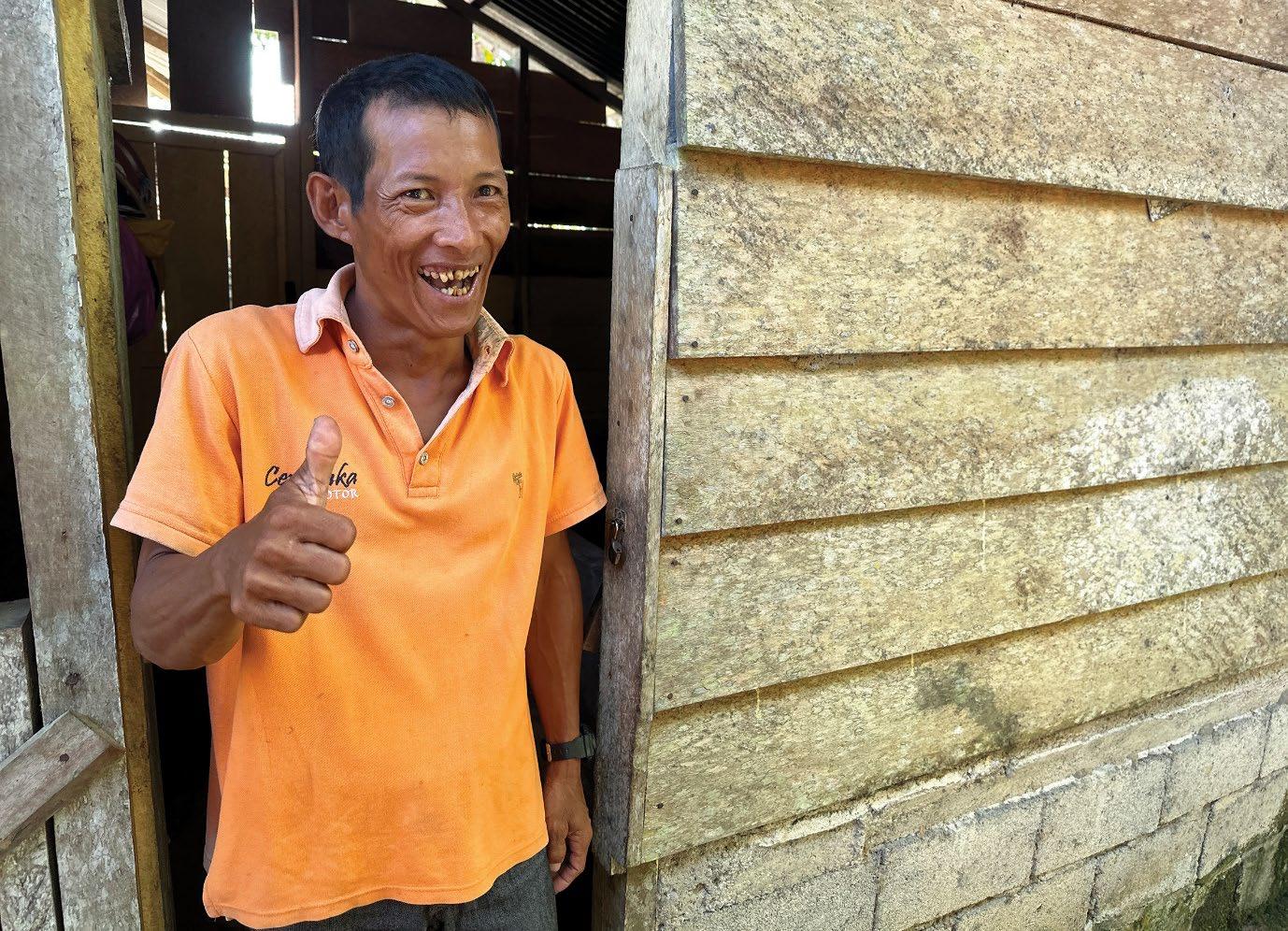
It's not o�en that a toilet is a source of joy and safety, but for Firman and his children, that’s exactly what their latrine brings.
“Before I had this latrine, I used the litle river down there. If someone wanted to go to the toilet at night, it was dark and slippery…and there were accidents in the rain.”
Now, a�er using bamboo to pipe water directly from an elevated spring, life is easier and safer for Firman and his whole family.

Shyam has overcome much in her life, but when her school’s disability-friendly toilet was deemed unusable her educa�on almost came to a halt.
“It was difficult to atend school regularly because of the inadequate facili�es…I was unable to use my wheelchair to the toilet because of the gaps in the ramps.”
Manoj Sing, the school’s principal, iden�fied the problem early and worked with the district educa�on commitee to source a solu�on, but was unable to fully solve their accessibility issue.
At this point Lutheran Community Welfare Society (LCWS) came to the table to retrofit the structures to ensure that all students had access to basic necessi�es within the school.
Bhopla Marandi, a member of the school management commitee, is singing the praises of the partnership:
“Now students with disabili�es are no longer dropping out of school …
There is a 100% pass out rate from primary level schools to secondary schools for further study ”.
Now, with one significant hurdle removed, the future is certainly brighter for Shyam and all of the students, and a whole world of possibili�es awaits.

Musa used to farm sweet potatoes, lengalenga (amaranth) and tomatoes, but the quan��es he was able to harvest were too small to feed his family and sustain their livelihood. Without a nutrient-rich organic manure, Musa’s crops simply weren’t yielding large enough harvests.
Enter the goat.
Goat manure is brilliant for crops and within a season
Musa saw his harvest jump from 200 kilos of corn to 500 kilos!
The boun�ful harvests have meant that Musa can live off the money he makes – he can feed and clothe his family, harvest larger areas leading to larger returns, and access health care when his children fall ill.
His goat will eventually give birth to kids, which in turn means that Musa can expand his crops and fields. While he’ll have to enlarge the cowshed, it’s a happy problem to have given the valuable nature of the livestock it will need to house.
Musa and the wider coopera�ve plan to buy cows and pigs, along with motorcycle pumps to make farming easier during the gruelling dry season. The coopera�ve even has plans to purchase a huller and mixed mill for processing, meaning that they can generate profit from all stages of the harvest.
One goat may not seem like much, and it can be hard to see how such a stubborn animal can have such a profound impact on a community, but such is the power of God’s crea�on…from something small and stubborn comes a rich harvest for all the people…and with it, hope.

For years, 53 year old Bhadia hoped she would one day own her own business. However, Bhadia struggled to make ends meet, and had difficulty at work ,due to a disability in her right hand. Her two sons were unable to finish school due to illness, and her younger child also had to leave school for the same reason. While her husband cared for the home and worked locally, Bhadia made the difficult decision to work in India as a wage labourer with her two sons.
Despite these hardships, Bhadia was commited to suppor�ng her family and held on to hope of an independent future for them.
That hope came to life through the work of ALWS partner, LWF Nepal. The project turned Bhadia’s life around: “I gained an understanding of how to run a business…and understood that I did not constantly need to travel to other na�ons and work for a living. I received financial aid and purchased 6 pigs to start my pig farming enterprise.”
Those 6 pigs have changed everything as Bhadia can sell the piglets for profit and now has plans to expand her dri� and her farm. Her daughter-in-law helps out with the everyday piggery ac�vi�es and Bhadia no longer travels away from family to provide for them:
“I am happy and remain occupied thanks to this business.”

Laxmi and her family know the true value of a scrabbling brood of chickens.
Laxmi is the chair of the Janagita Women’s Group in Nepal, a group of women set up to support vulnerable groups through agriculture and livestock.
Alongside raising the chickens, Laxmi is able to sell crates of their eggs at local markets, and the income from the eggs have enabled her to purchase 3 goats. This, in turn, has meant that Laxmi can provide for her family of 5 children, one of whom – Khaga sara – is living with severe intellectual and physical disabili�es.
Laxmi’s husband was working away in India for a �me as a night guard, but has since had to return due to illness and now joins Laxmi in her chicken farming.
As for the true joy of the chickens, it’s best coming from Laxmi herself:
“My biggest happiness is that my husband is back here and sharing the work with me. We are making decisions together.
I am stronger and sending our 5 children to school. My heart is strong…”

Before the ALWS-supported project assisted him, 25 year old Richard had to work in the fields as a labourer. He was so poor he didn’t have soap to wash his clothes, let alone any farm animals.
Members of the Ingo Ukore coopera�ve came alongside Richard and trained him in basic business skills including how to obtain a loan, how to start and maintain a business, and how to cul�vate his fields.
With this support, Richard was able to buy a plot of land, build his own house for his wife and child, and purchase a pig. The yield from his crops has increased as well, as the organic manure and fer�lizer has resulted in a boun�ful harvest.
“ The milling machine opened up new horizons for us, it was a way to transform products and make more money…with the money we built a barn and bought 6 pigs…another part was used to buy fer�lizer and plough the fields.”
Now, Richard is joyfully op�mis�c about the future and the work of the coopera�ve…
“I am looking forward to many things. I can ask others if I need something, because they trust me. If someone gets sick in my family, I can pay to treat them. When sharing the benefits, all members are happy with the work done.
“I am happy about the experience because I am proud of my work and I do it right.”

Before drip irriga�on, Ayenai and Akure carried water in jerry cans and watering cans back and forth from the net houses to the water tank. Crops of capsicum, sukuma, spinach and tomatoes were painstakingly watered by hand as the farmers trekked to and fro morning and evening.
Now, with the installa�on of the drip irriga�on system, water flows independently to the net houses and the vegetables harvested can be sold at local markets around the town and refugee camp.
The benefits of the harvest filter across the community, as refugees buy the vegetables from the farms to sell back in the camp, and supermarkets and eateries place orders for the vegetables.
Locals, including Elim, are also able to farm their own small plot of land beside the net houses where they can grow vegetables to feed their families.
An abundance of different crops is farmed here, and the drip irriga�on systems ensure that families in these communi�es and camps will con�nue to benefit from their produce for years to come.
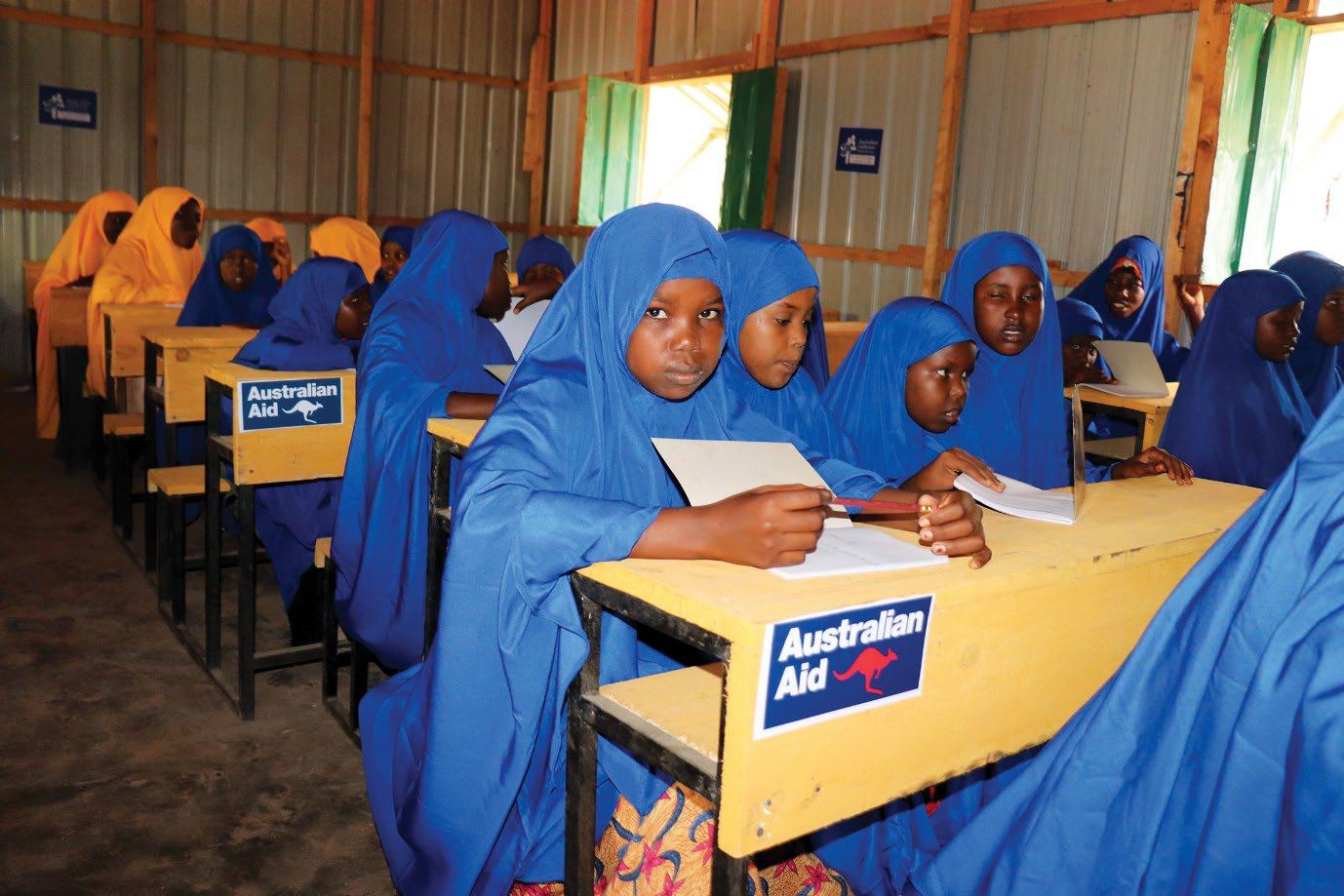
From a very young age, Jamilah longed to go to school, but as the oldest child Jamilah was depended on to help support her family.
Although educa�on is highly valued in Somali culture, poor economic circumstances mean that work is o�en priori�sed over educa�ng children. Such was the case for Jamilah un�l her mother’s determina�on saw her eldest daughter begin studying at the age of 14.
Now at 16 Jamilah is thrilled at the opportuni�es schooling brings: “I enjoyed maths so much that I feel an inner sense of belonging and atachment to this subject.”
Her younger siblings are also keen to start school and eager to learn: “They always come to me when I am reading my books and they try to read too. At first, they could not understand anything, but now they understand a lot and they can’t wait to go to school and get their own books.”
Through ALWS, you provide school uniforms, desks and learning materials – such as those contained in the school kits – to Jamilah and other students which enable them to excel in their educa�on.
As for Jamilah, her passion for educa�on extends into a bright future; “My dream is to atend university and become a Mathema�cs teacher to help eradicate illiteracy among my people, par�cularly those who are from poor backgrounds.”
With the help of ALWS, this dream is well on its way to becoming a reality for Jamilah and many other children in Somalia.
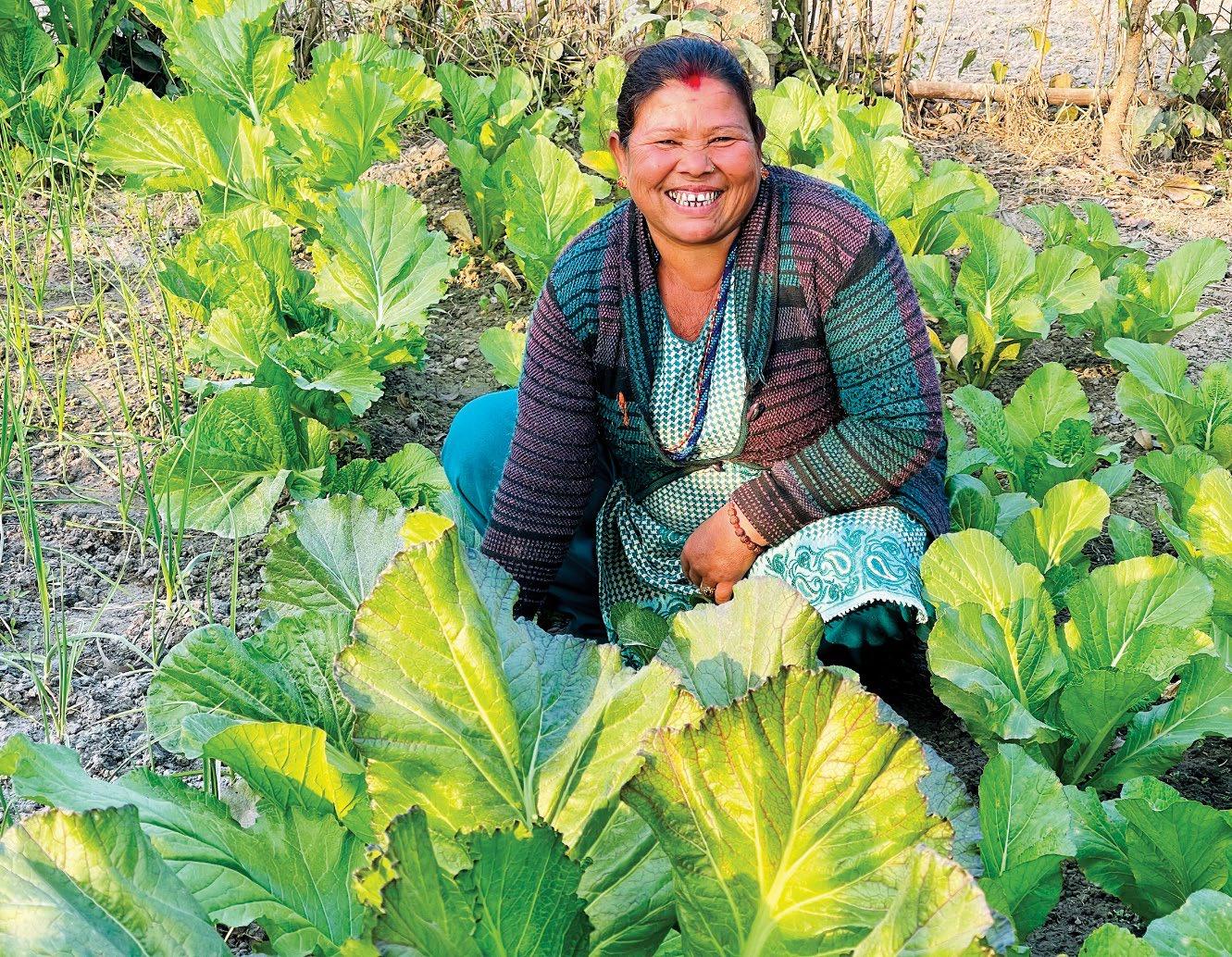
Despite much hardship, Tara, 53, has gone way beyond just making the most of her lot in life, and has stepped up as an inspira�onal role model for others in her community.
Surrounded by civil war and mired in poverty, Tara was forced at a young age to join combat and s�ll bears the mental scars from combat.
Determined to move forward, Tara rented some land and started working in agriculture, relying en�rely on seasonal labour to provide a wage for her and her family.
An opportunity arose for Tara to take part in the LWF program offering training in agriculture enhancement and technology, along with equipment and resources to grow off-seasonal vegetables.
As Tara explains, “Even though I have spent more than 35 years working in agriculture, I had no idea that using various agricultural technologies might be used to generate money on just a small area of land. During dinner, I explained to my family all the lessons I had learned during the training so they could help me on the farm.”
Now, Tara’s husband, two sons, daughter-in-law and granddaughter all help out and Tara can support her family financially.
It is said that from litle things, big things grow, and never has this been truer than for Tara:
“I am proud now that I am referred to in my community as an organic vegetable owner.”

Prior to the COVID pandemic, Sonu was running a grocery store with her husband and teenage son. Lockdowns and her husband’s illness forced Sonu to seek alternate means of survival as she shouldered all responsibility for her family.
Thankfully, Sonu’s situa�on began to turn around as she became involved in the ALWSsupported project. Through the project’s 3 day farm-based training, farmers school and business planning skills sessions, Sonu gained essen�al knowledge and exper�se in banana cul�va�on.
Armed with her new exper�se, Sonu received financial assistance and resources such as drip irriga�on, banana seeds and mulching to set up her own plot.
Sonu is now able to sell her produce to the local market and is diversifying by plan�ng Lady Finger bananas and chillies alongside her original banana plants.
The vital training and support Sonu and her family received from ALWS partner, LWF, has meant they can dream bigger, with Sonu planning on leasing more land in future to expand her business.

Every couple of weeks, Marina, Jasmina and other women from their village meet together to make banana chips. It’s a hot, �me-consuming process, but they gladly share the work between them, laughing and cha�ng while the tv plays in the background.
“We can work together with other women and support each other. We grow in knowledge and skill.
We can also make chips on our own later.”
The chips the women make are sold on to the Gallery Coopera�ve, with the proceeds crea�ng addi�onal income for the farmers group and at the end of the year, profits are distributed to members of the farmers group.
These women have been filling their homes with the warmth of this prac�ce since April 2020, and partnering with ALWS partner CDRM&CDS, has resulted in the purchase of vital resources for them to con�nue their work.
The resul�ng banana chips may be delicious, but the sweetest joy is found in the companionship and laughter of the women as they gather together, forging bonds that strengthen and enhance the wider community.
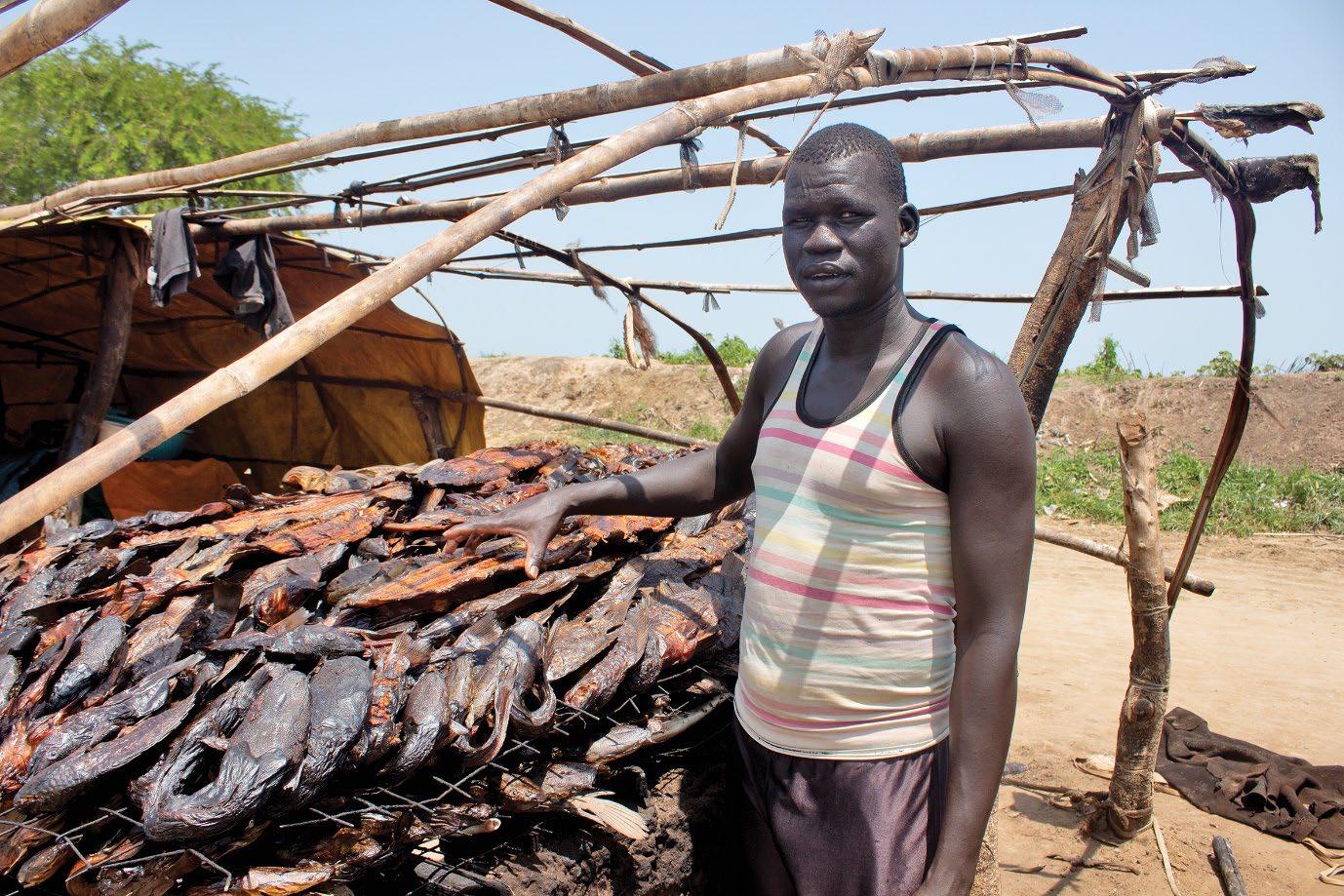
Fishing ac�vity in South Sudan has increased significantly since villages received LWF fishing kits.
Many residents, including 35-year-old Anyieth and his wife, have embraced fishing and now depend on their catches to provide for their families.
Prior to receiving the LWF kits – containing rods, nets, lures, and a fishing line – Anyieth was using locally made basins to catch fish, o�en to no avail. “The quan�ty was poor, I would only get a few for home consump�on, but not very many”.
Fishing materials were shared between families, supplies were low and catches were sparse.
Now, the income Anyieth receives from selling fish caters for food, medicines, school fees, clothes and basic other needs for the family.
Looking cheerful, Anyieth is quick to express just how grateful he is for the support and resources received from LWF, while recognising that giving back to his community is just as necessary:
“I learned that it is another worthwhile gesture of improving my community. I hope I will put all of my children through school!”
There are s�ll challenges with preserving and transpor�ng their catches to local markets, but for now Anyieth is quick with a smile and praise to God for His provision through LWF.
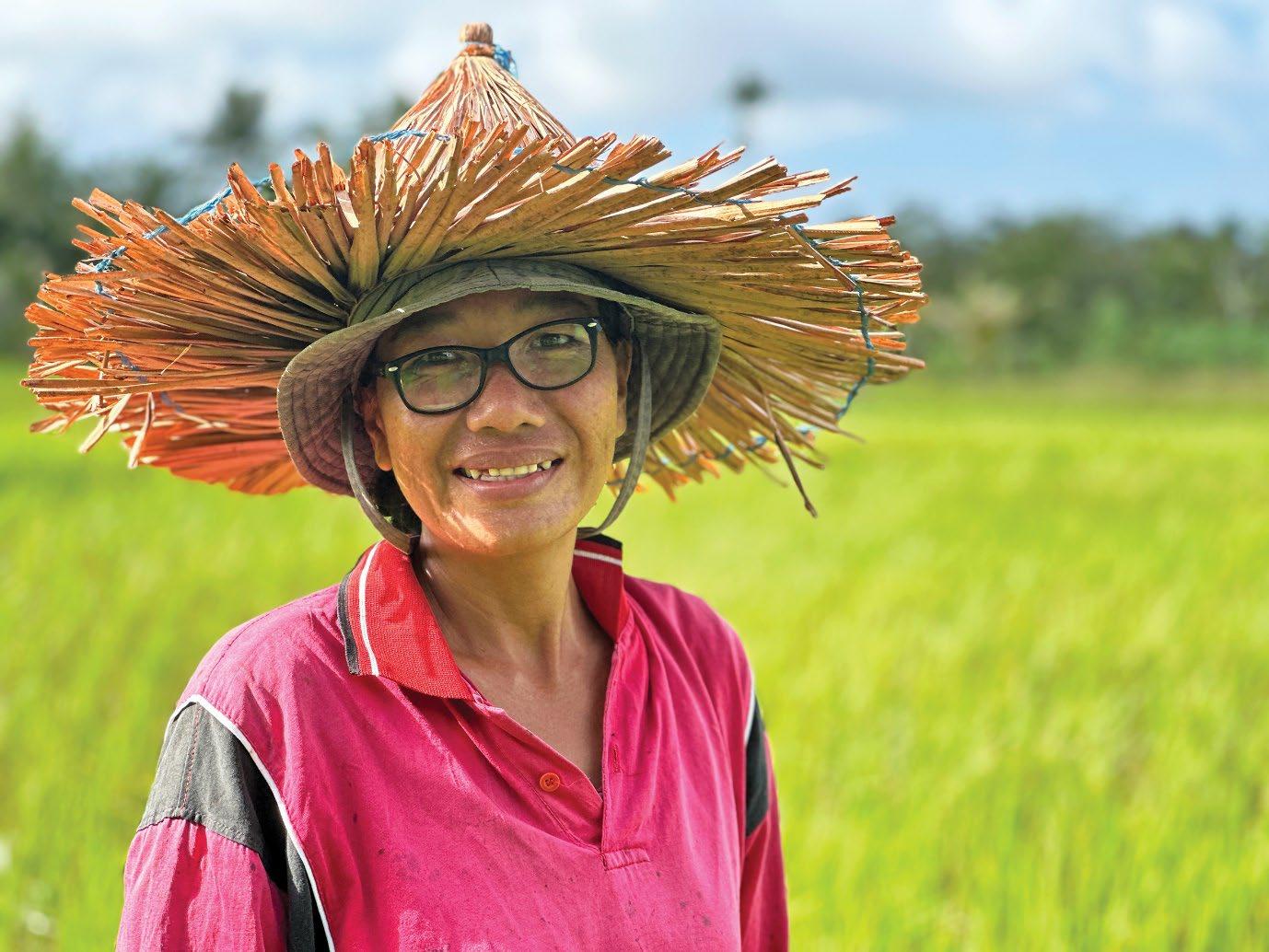
Meri ’s laugh rings out across the field as she spots her friends working nearby.
At 46, Meri has worked hard to ensure that her children receive the educa�on she was never able to obtain. “I was married while I was s�ll 19 and my husband was a boat driver. I worked really hard to save everything I could so the children could con�nue school.”
In 2020 Meri and her husband joined the ALWS-supported Farmer’s Group and learnt vital skills in improving her harvest.
As well as learning to beter plant her rice fields, Meri also learnt how to farm eggplant and taro. Meri has just planted her fi�h rice crop using the skills obtained through the Farmer’s Group, and each crop has improved on the one before.
“ The first crop yielded 2 large sacks… My last harvest yielded 8 sacks of rice, which is enough to feed me and my children. I have not had to buy any rice.”
Meri’s children have since finished school, with her eldest entering the banking industry and her daughter working as a volunteer nurse. Both children s�ll live with her and help out in the fields at threshing �me, but for Meri, her fields are her happy place.
“My only dream is to work in the paddy field and have enough to survive for my daily needs. I love working in the field. It makes me happy to see to the birds flying over my field, even if they eat some of my rice!”
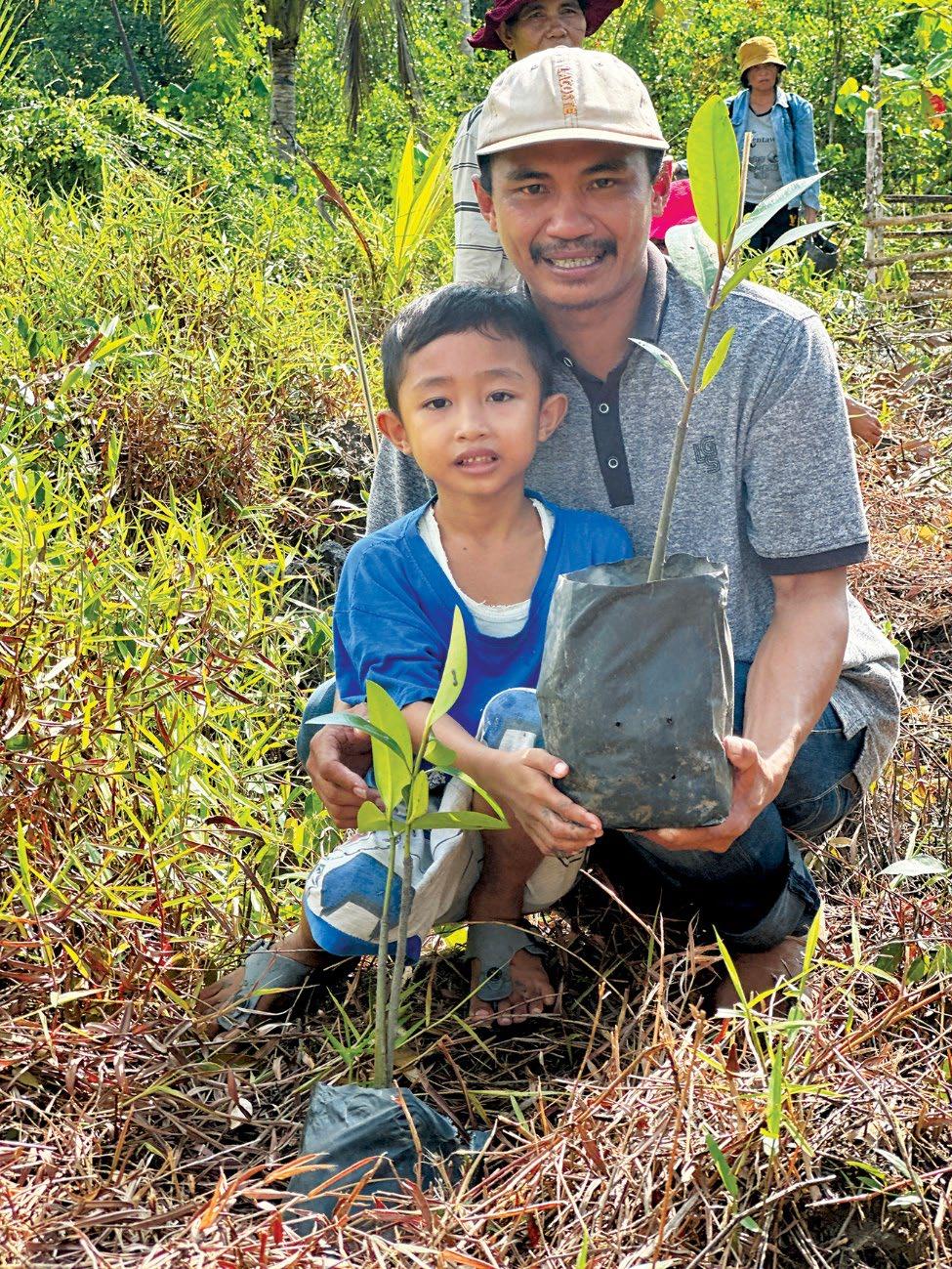
For years, Victor and his village have been figh�ng the rising �des of the ocean by atemp�ng to plant mangrove trees, but no mater what they did the water swept mud up into their homes. Houses have been abandoned as some families were forced to leave by the rising �des, king �des come through 3 �mes a year, and the main road floods daily causing potholes and bumps.
ALWS partner, CDRM&CDS, began to turn the �de in 2021 with the forma�on of a Disaster Risk Reduc�on group.
This group, with Victor at the helm, iden�fied the need to stop erosion at the shoreline and mobilised the local community to collect seeds and grow mangrove seedlings for the plan�ng.
As Victor notes “Many of the local houses are surrounded by water at high �de everyday. Despite the challenges, families don’t o�en move because they can’t afford to. We feel safer when we see mangroves.”
The community has come together to learn how and where to correctly plant the trees to atempt to stem the waters.
For Victor, that peace of mind and enthusiasm brings a smile to his face:
“I feel very proud that in the future we can be safe from the waves.
We are all doing our part to protect our village.”

Mamad has a passion for business that is as clear as the grin stretched across his face.
Born with a speech disability, Mamad ini�ally found work as a manual labourer but when the company closed down a�er 17 years he found himself without income.
Taking the ini�a�ve, Mamad began baking cakes and other food items to sell at the markets.
Rising at 2:30am, Mamad prepares anywhere from 100 – 240 cakes before stacking them into a wheelbarrow and walking over 3km to market.
In 2022, Mamad joined the Persons With Disability group facilitated by CDRM, which has opened up a whole new world of social and economic connec�ons. “I feel really happy to join the PWD group as it is really good to meet others with disability and share our struggles. I realised I am not alone.”
PWD approached Mamad for a leadership posi�on within the group, but Mamad found that his business was happily taking up all of his spare �me and he has his sights firmly set on growing the range of products he provides:
“I applied for a loan so that I can expand my business to sell more kitchen items and kitchen foods, like sauces and litle pies.”
PWD’s partnership with Mamad’s business has ensured a delectable future not just for Mamad but for members of his community struggling with disabili�es.
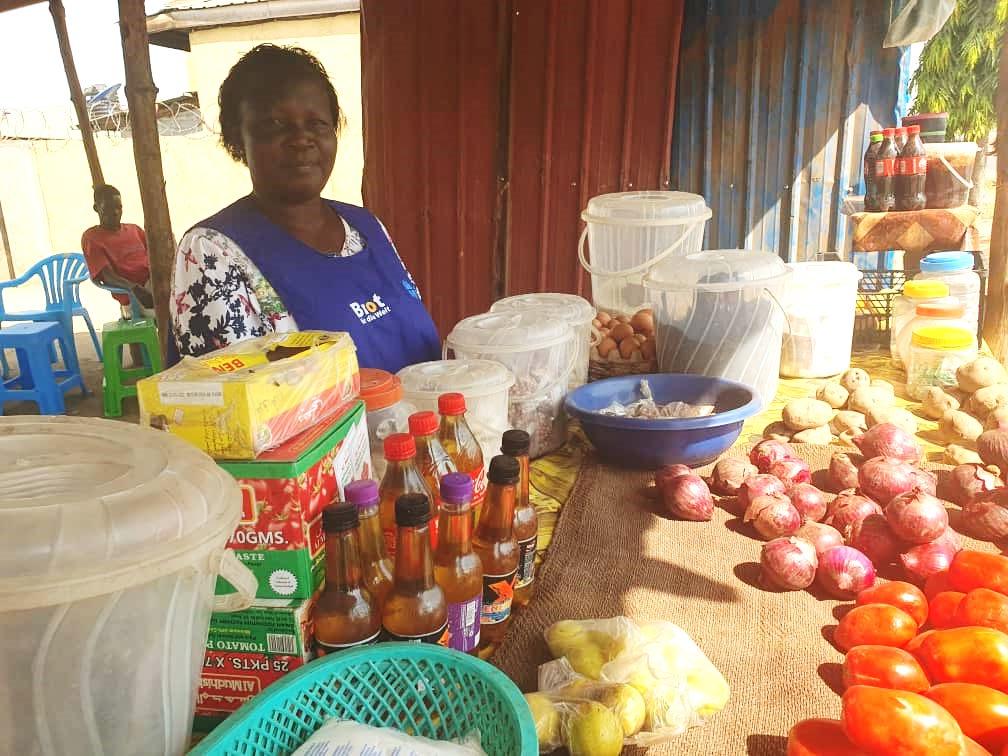
Jane, 48, has a similar story of how LWF support has turned both her life and the lives of her family around. Jane is a single mother to 5 children, and took in her late brother’s 3 orphaned children a�er he passed.
Jane was selected for the LWF small business management course, upskilling in planning, managing and growing her small food business.
Two weeks a�er the training ended Jane received business capital to expand her venture and now a steady income has turned her world around.
“I am happy to share that the small business has changed my life and the life of my dependents.”
“ With this assistance, I am able to feed my children, pay school fees, pay for their medical services and most gratefully, I have secured savings in case of emergency.”

Mamata, 27, knows all too well the vulnerability shared by Jane and Mamad. Mamata and her family live in a high-risk loca�on suscep�ble to recurrent flooding by the Kada River.
For Mamata, the threat of the creeping water is ever-present “Each year, the Kada River haunts me. My family’s economic problems always concern me. I also wanted to do something, but I didn’t know what to do.”
A simple discussion in 2022 with the ALWS-supported LICED Project offered Mamata a lifeline. Mushroom farming makes the most of the damp on the floodplains, and Mamata was keen to seize the opportunity with both hands.
Now, having received training in cul�va�ng, collec�ng and storing the mushrooms, Mamata is able to grow mushrooms to sell to the small towns nearby. She is hoping to increase her mushroom produc�on even further a�er the rainy season.
“Growing mushrooms has made a big difference in my life.
Knowing I can help maintain the financial security of my family has given me more self-assurance and a sense of accomplishment…”
Hope is something the waters of the Kada River can never wash away.
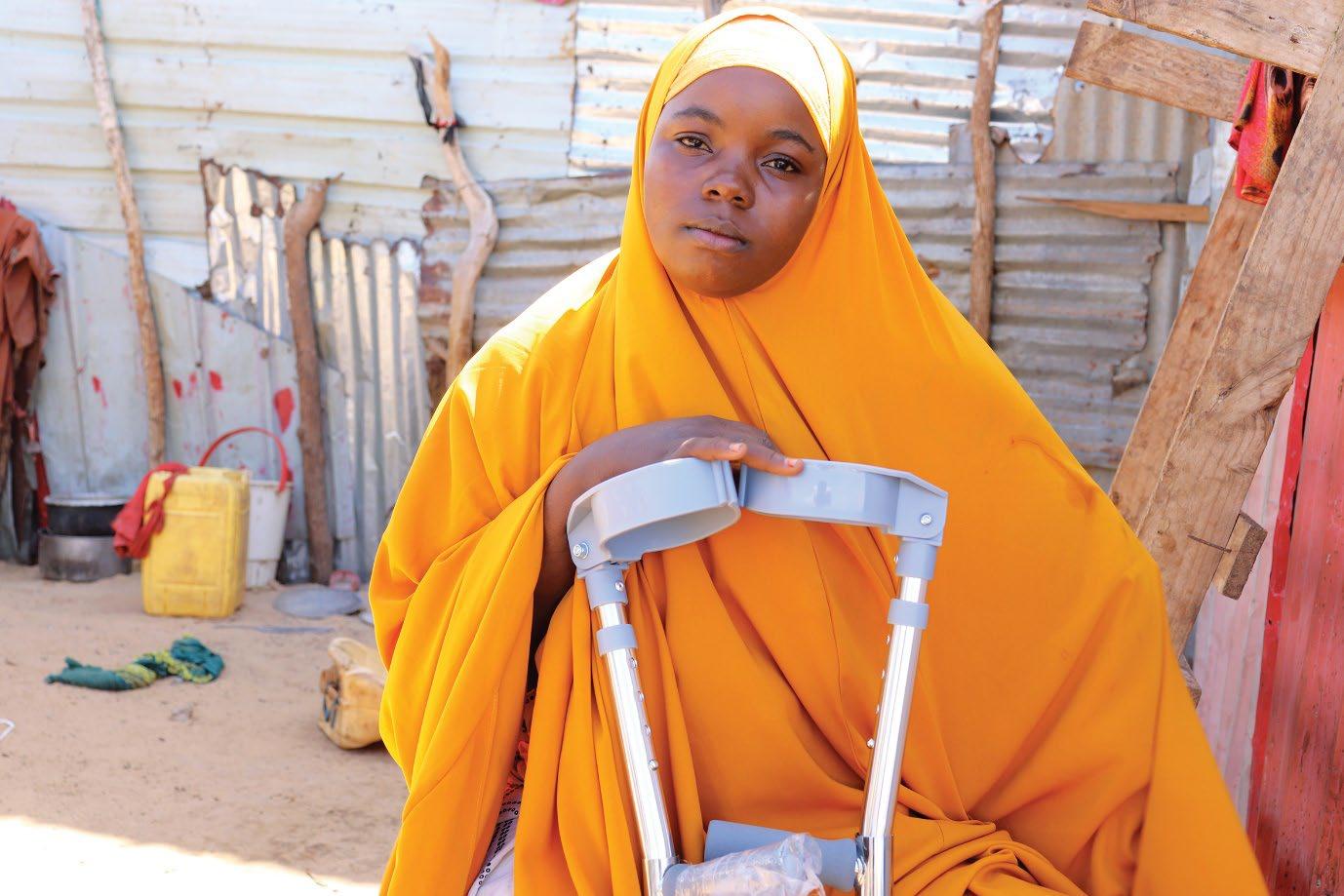
15-year-old Bilan is used to having the odds stacked against her, but no mater the challenge her enthusiasm for life and the future never wanes.
“Growing up with the help of elbow crutches has been a difficult affair for me and my parents…But later I realized that disability is not an inability and resolved to beter my life…I had to learn how to adapt to the world, instead of the world adap�ng to me.”
Bilan’s wisdom and zeal for life belies her age, and atending school at the Badar Model Schol in Kismayo has only served to set her hope for the future ablaze:
“I am so passionate about English…I want to excel in it, and become an English lecturer at Somalia Universi�es.”
Her plans don’t stop there as she chats excitedly about also wan�ng to be a doctor, admi�ng that she is atracted to the things that people think she cannot do.
“I always joke that the best way to get me to do something is to tell me I couldn’t do it. That gives me lots of spirited determina�on and dedica�on.”
ALWS has been a constant support for Bilan, providing elbow crutches and mobility supports, hygiene kits, learning materials, transporta�on to and from the EARC Centre and 4 months of food vouchers as part of the LWF drought response and mi�ga�on program. And if you ask Bilan, there is nothing that can hold her back now.

Zainab and her parents have walked a long road to bring her to the front of the classroom today, but as she looks out across the faces of her students, Zainab wouldn’t want to be anywhere else.
Zainab’s parents met as refugees while living in the Dadaab camp. Both families were agro -pastoralists in Somalia and had fled during the civil war a�er mili�a atacks and con�nued threats of violence.
Zainab was born in the Dadaab refugee camp, and has spent her whole life within its community.
Now 25 with two children of her own, Zainab is passionate about the educa�on of refugee children:
“Educa�on is a must-have in life. It is the light of our lives.
Whether it helps us secure jobs or not, we must all get educa�on…”
There are many challenges when it comes to educa�on within the camps including communica�on barriers, refugees being transferred between camps and o�en schools being located long distances from children’s homes.
Zainab recognised these challenges and the gaps in learning offered, and resolved to do what she could to address the situa�on.
With the support of ALWS, Zainab has studied early childhood educa�on and completed courses in communica�on and technology (ICT) and competency based curriculum (CBC). These courses teach educators how to support learners with visual impairments, including basic sign language, and how to support learners coming from unstable families with low self-esteem.
For Zainab, teaching brings a sense of accomplishment and purpose, and ignites her passion to lead and advocate for the rights of the marginalised within her community.
“Leadership is the mirror of the community…I foresee my future in the educa�on sector, hoping to rise to provide policy direc�on especially on child educa�on.”
Leadership in educa�on is a path Zainab is determined to walk, and by doing so she paves the way for all of her students to come a�er her.
